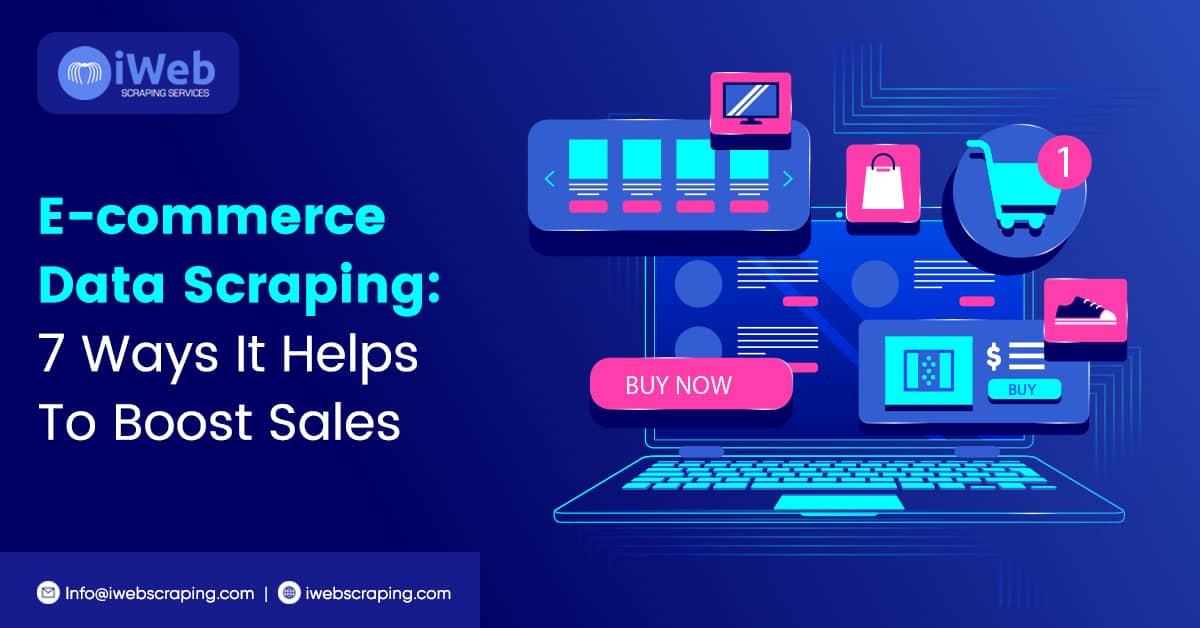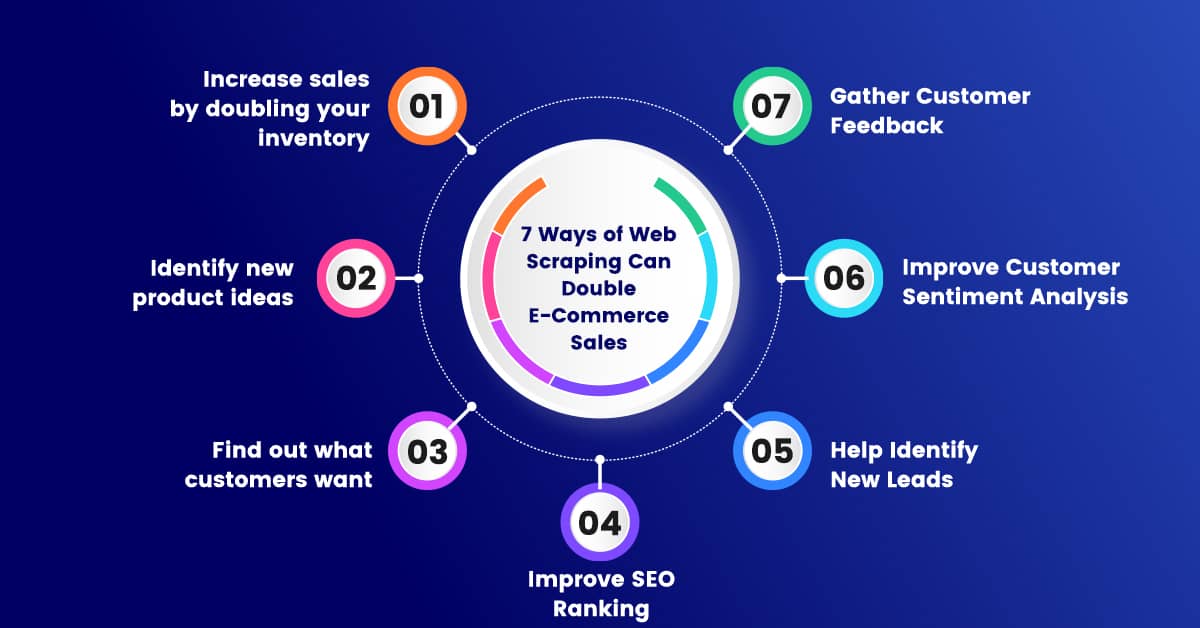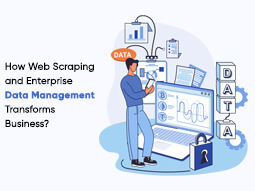E-commerce Data Scraping: 7 Ways It Helps To Boost Sales

E-commerce is one of the fastest-growing industries in the world, and it's only getting bigger. With more than 2 billion online shoppers worldwide, it is no surprise that e-commerce businesses are becoming more popular.
The problem with e-commerce is about more than just having an online shop. To succeed, you must find ways to get people to your store. This means ensuring they can find your product and purchase without problems.
How do you do this? One way is by using e-commerce data scraping services. What is e-commerce data scraping, though? And how can it help boost your sales? Let's learn about all of this in this article.
What Is E-Commerce Data Scraping?
E-commerce data scraping is the process of gathering information from online stores and websites. You can collect data from various sources, including product listings, social media sites, blogs, etc.
The main goal of e-commerce data scraping is creating a marketing database. This dataset you can use later to build advertising campaigns, create personalized products and newsletters or provide customer service.
Data scrapers are typically software applications that run on a computer. They can also be built as web or mobile apps using JavaScript frameworks like ReactJS or VueJS.
E-commerce Web Scraping Use Cases
E-commerce web scraping is a great way to get additional information about your products. It is also a great way to get additional information about your competitors (and customers).
Let's take a look at some of the most popular use cases for e-commerce web scraping:
1. Product Comparison
If you want to compare two or more products, it is sometimes apparent which ones are similar. With e-commerce web scraping, you can easily find out how much each product costs and how many reviews it has received.
2. Keyword research
If you are looking for keywords for your store but need help determining which ones are applicable, you can use e-commerce web scraping to quickly find out which keywords people are searching for when they visit other stores' sites. This will help you determine which keywords are worth targeting and are likely to avoid bringing in sales.
3. Competitive analysis
You can use e-commerce web scraping to analyze your competitors' products to determine what works well with their customers and what doesn't work so well — this will help you come up with ways of improving your product listings so that they're more appealing than those of your competitors' sites."
4. Pricing Strategy
Many e-commerce sites use price changes to attract customers. As a result, it's common for prices to fluctuate frequently and by significant amounts. You can analyze price changes over time using web scraping to determine the best time to buy.
5. Campaign Optimization
If you run a campaign, e-commerce web scraping can help you determine the best keywords and target audience to reach your goals. It can also help you track the performance of your ads and make changes accordingly.
For example, if you are running ads on Google AdWords, it would be helpful to know which one is performing better so that you can increase spending on that platform.
6. Revenue Optimization
E-commerce is one of the most competitive industries in the world. To survive, businesses must stay on top of their game and optimize their revenue stream. This means keeping track of your competitors, tracking product prices and sales volume, and adjusting your website to increase profit.
7 Ways Web Scraping Can Double Your E-Commerce Sales

Web scraping is a powerful tool for market research and business intelligence, but it can also be used for e-commerce. With the help of web scraping, you can boost your sales and revenue stream. Here is the following way how.
1. Increase sales by doubling your inventory
If you have an e-commerce website, you probably know how important it is to offer various products. You must ensure customers can find what they want when visiting your site. They may take their business elsewhere if they are still looking for what they want.
But how do you know what products to stock? The answer is simple: use web scraping software to get information about the products that are selling well right now so that you can stock those too! There's no better way to ensure that your customers will always find what they are looking for when they visit your site than by using this technique.
2. Identify new product ideas.
If you are selling a product that has been around for a while, web scraping can help you identify potential changes or improvements that could make your product more appealing to customers.
For example, customers might want more durable products if you sell sporting equipment. Or if you sell clothing, you might find out that more people want clothes that fit well into their lifestyle and meet their needs.
3. Find out what customers want.
Knowing what your customers want is the best way to improve your sales. To do that, you need to know their preferences, how they think, and how they buy. One of the best ways to know this is web scraping.
It allows you to access information from the internet and use it to find out what people are looking for when they visit your website or shop at your store.
You can use this information to improve customer service, develop new products, and improve your marketing strategy.
For example, if you are selling women's clothing online, you might find out that men are more likely to buy specific items than women are — so you could try marketing those items differently to appeal more strongly to men.
4. Improve SEO Ranking
SEO is one of the essential metrics businesses look at when evaluating their websites. To improve your SEO ranking, you must ensure that your website has relevant content people are searching for.
Web scraping can help you find this information by extracting data from search engine results pages (SERPs) containing keywords people are searching for. Using this data, you can create content on your website that will rank high in SERPs and generate more traffic for your site.
5. Help Identify New Leads
One of the essential functions of web scraping is identifying new leads and prospects. You can use web scraping to collect information about people who visit your website, such as their names and email addresses. After collecting this data, you can send personalized emails to each prospect with a customized message that will likely encourage them to buy from you.
6. Improve Customer Sentiment Analysis
You have an email list and a store. You know who your customers are, what they like, and what they do not like. But do you know how they feel about your brand? Do they like it? Are they loyal to it? What are their concerns?
How can you make them happier as customers? These are all questions that can be answered with web scraping. Using data from social media, forums, and review sites, you can analyze customer sentiment and gain insights into improving your customer experience.
7. Gather Customer Feedback
E-commerce businesses can easily collect customer feedback from their websites, social media pages, and product reviews using web scraping. This information can be used to improve their products and services, leading to increased sales.
Conclusion
So as you can see from the above points, e-commerce data scraping can be a precious tool in building a business online. It is easy to get started, whether on a tight budget or willing to invest more heavily. It will save you time, money, and plenty of headaches in the process. But most of all, it will save you a lot of time with your business and let you focus on what matters most--your customers.




